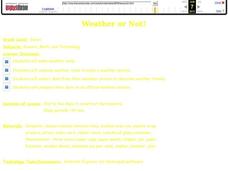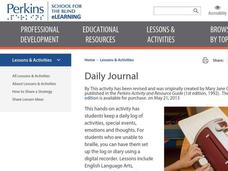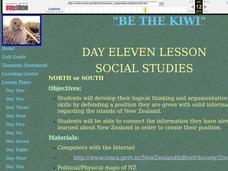Curated OER
Weather or Not!
Seventh graders discuss weather. In this meteorology lesson, 7th graders view a movie on weather and take a quiz. They work in groups to make weather tools for a class weather station.
Curated OER
Exploring Biomes Lesson 2: Biome Research
Learners view a PowerPoint presentation on biomes and their classifications. Divide them into groups and assign them each an individual biome to research. There are pictures of the PowerPoint slides and notes about what to teach for...
National Security Agency
Partying with Proportions and Percents
Examine ratios and proportions in several real-world scenarios. Children will calculate unit rates, work with proportions and percentages as they plan a party, purchase produce, and take a tally. This lesson plan recommends five...
The New York Times
Super Brand
Children can recognize popular brands from an early age, but these images symbolize much more than what they advertise. Take a journey through the design of a logo with a lesson that focuses on the history and ubiquity of the Super Bowl...
Curated OER
Deal Me In
Middle schoolers study the components of a deck of cards and conduct an initial experiment in the probability of drawing various types of cards from a deck. They play two rounds of poker to discover the probability of drawing several...
Curated OER
That's The Way the Cookie Crumbles
Third graders work with money values and making purchases. In this money lesson, 3rd graders listen to Donna Guthrie's book, Real World Math: Money and Other Numbers In Your Life. They make money cookies either with a recipe or with...
Curated OER
Elastic Recoil in Arteries and Veins
A lab in which high schoolers examine the difference between arteries and veins. Budding biologists will find out which blood vessel can stretch furthest, recording their data in a table then answering several questions evaluating their...
Bright Hub Education
Using Evidence and Supporting Details in Writing
In expository writing, it is important to back up claims with evidence and details. Help your class to develop their writing with notes on different types of evidence. Once they have the basics down, practice with a sample thesis and...
Perkins School for the Blind
Daily Journal
Keeping a daily journal is fun. It builds strong writing skills and provides an expressive outlet. For children with visual impairments, it's even more important. It provides a way for them to connect written word with real events, which...
Curated OER
Race to the Top
Here is a game that will help your young mathematicians practice number recognition and writing numbers. Played with a spinner or dice, individual learners or a pair will play this fun number game. They will roll the die or spin the...
American Chemical Society
Exploring Baking Powder
Meant to follow an activity in which young chemists identified an unknown substance by chemical reactions, they now take their data and use it to determine which materials combine to make up baking powder. This lesson is one that can be...
Dick Blick Art Materials
Glue Paint Symmetry Prints
Add watercolors to white glue, paint onto clear film paper, fold, open, and voila, a butterfly! This art project, designed for special education classes, but perfect for any classroom, is sure to engage your young artists.
Curated OER
Leaves: All-Natural Solar Collectors
Take a good look at tree leaves and notice the adaptations for collecting solar energy. Pupils trace the margins of five different leaves onto graph paper and count the number of squares covered. They then relate this infomation to the...
Math Can Take You Places
Picture This
Engage scholars in a ratio lesson that employs real-world scenarios. Learners will compare the length and width of pictures and use a table to identify ratio patterns. They watch "Math Can Take You Places" and discuss jobs that use math...
Curated OER
I'm Gone
Learners plan a mock mission to Mars. In this space science lesson, students work in cooperative groups and select one experiment to take on their mock mission. Learners create a mission plan form and send a proposed experiment to NASA.
Curated OER
Let's Learn About Plants!
Students discover different plants and plant parts by observing their campus. In this plant life lesson, students take a guided walk around their school with a magnifying glass examining everyday plants as well as photographing them....
Curated OER
Living and Non-Living Things
Take a walk and observe living and non-living things on the way. Young scientists practice making valuable observations and draw the details. You could require that your students complete a T chart of living and non-living things and...
Curated OER
Making Connections: Matrices, Graph, Linear Systems
In this set of activities, matrices and equations are explored. They work with matrices using pen and paper as well as graphing calculator. Additionally real-world problems are explored.
Curated OER
My Habitat
Students explore the environment they live in. In this habitats lesson, students define habitat and create a web in kidspiration. Students take a walk outside and record what they see and hear and may take pictures as well. Students...
Curated OER
Asking the Questions and Questioning the Answers
What would you ask a presidential candidate if you had the chance? Bring politics to your language arts classroom with this lesson, in which young readers brainstorm questions they would have liked the presidential candidates to answer....
Curated OER
The Whipping Boy: Reading Comprehension an Discussion
This outlines steps for reviewing chapters 9-12 of The Whipping Boy by Sid Fleishman. Small groups read the chapters together and then clarify any confusing parts. The class compares 2 different letters to determine which is better and...
Curated OER
We Are All Authors: Create a Book
Every child is an author with this engaging reading activity. First the class reviews the various parts of a book such as the title, author, dedication, and author-biography. Then each individual will choose a story of their own to...
Curated OER
Be the Kiwi
Compare the North and South of New Zealand. Exploritive minds identify which island is better to live on, taking into consideration such things as social, political, and economic aspects. They research an argument to present and debate...
Curated OER
Thesis statements: The Six Basic Claim Types
Evaluative or Analogical? The wolf in the story of "The Three Little Pigs" and the wolf in "Red Riding Hood" represent what can happen to the unprepared. Despite his defeat in the end, the Big Bad Wolf is a good example for kids because...

























